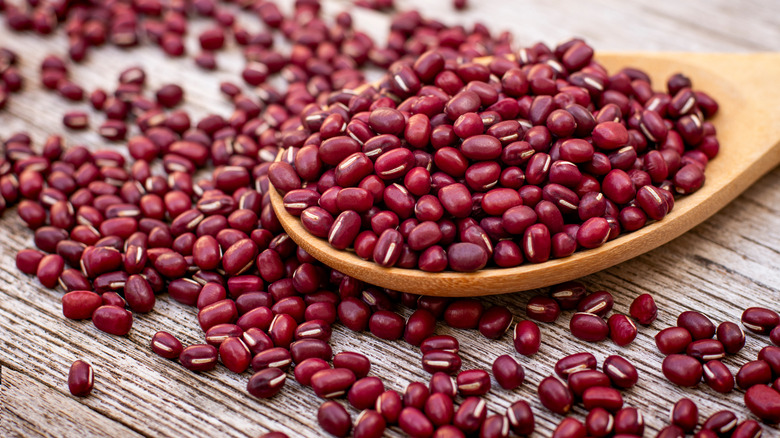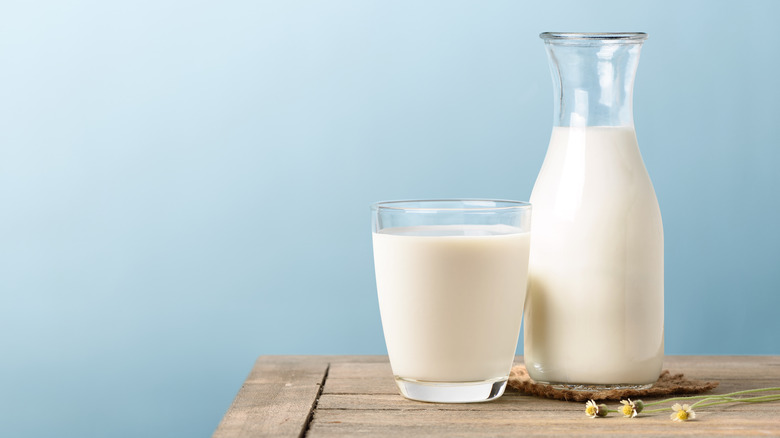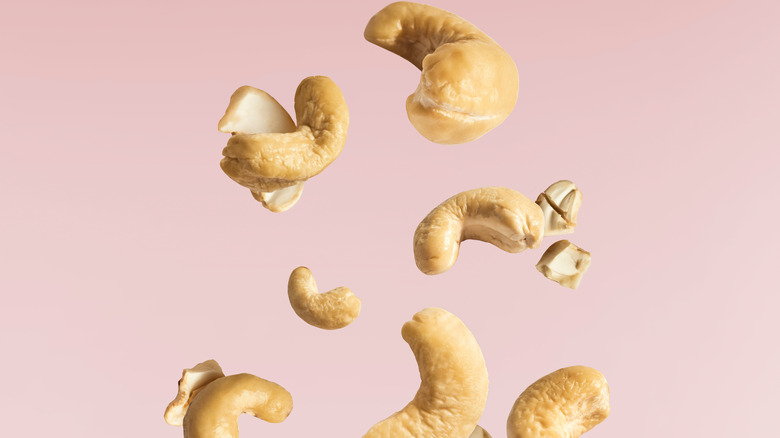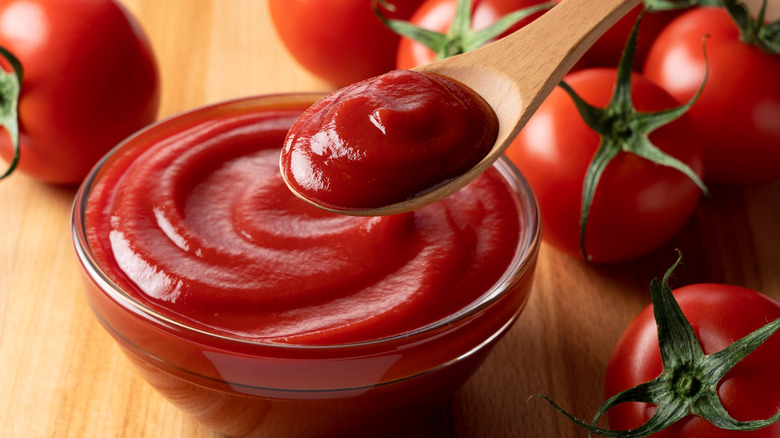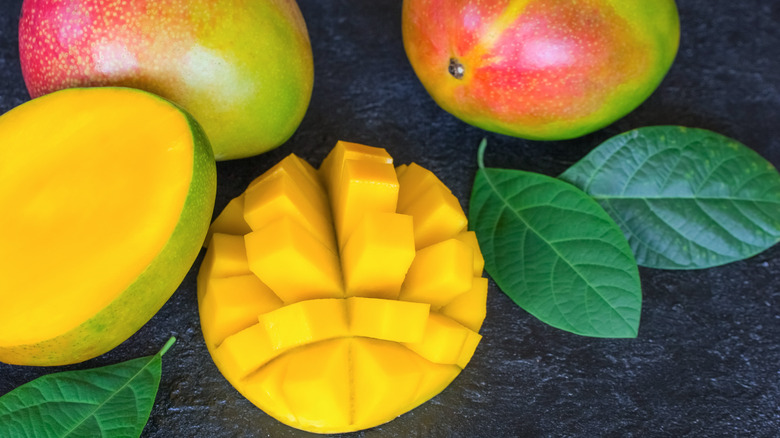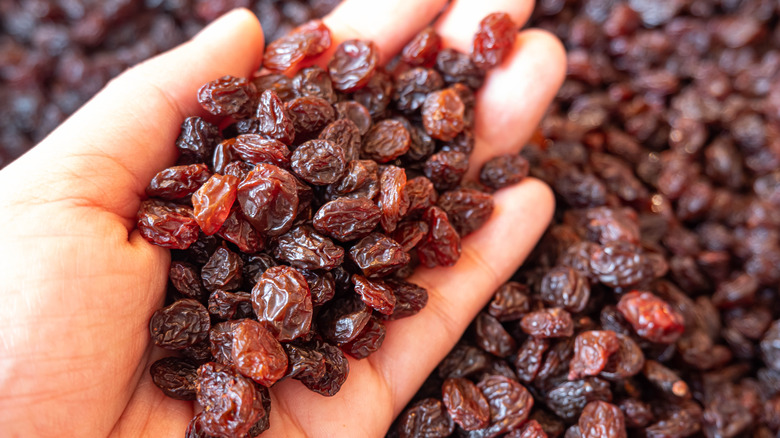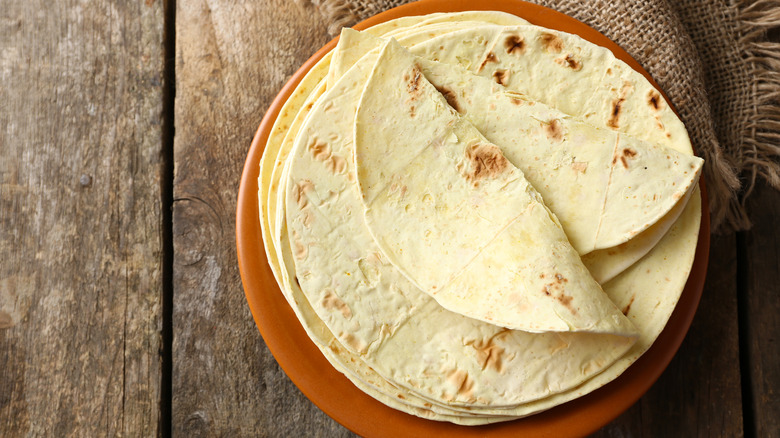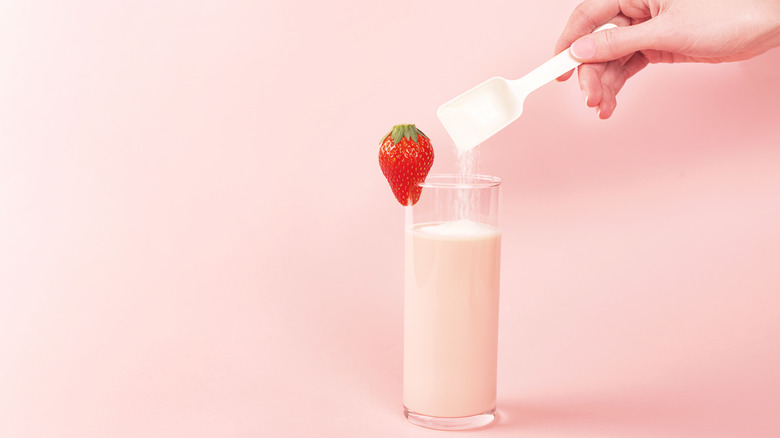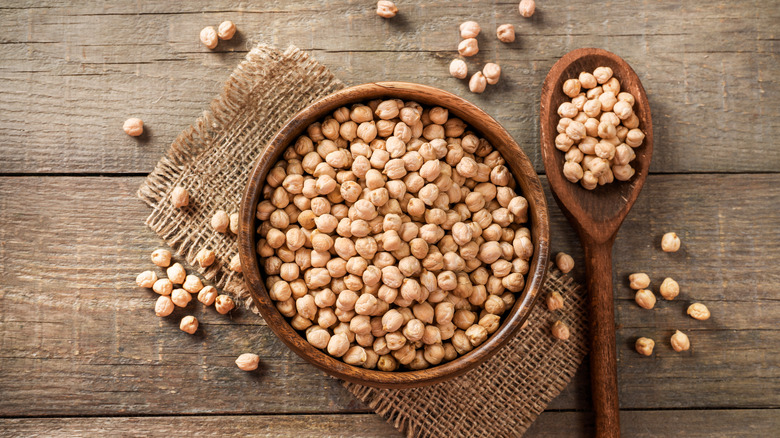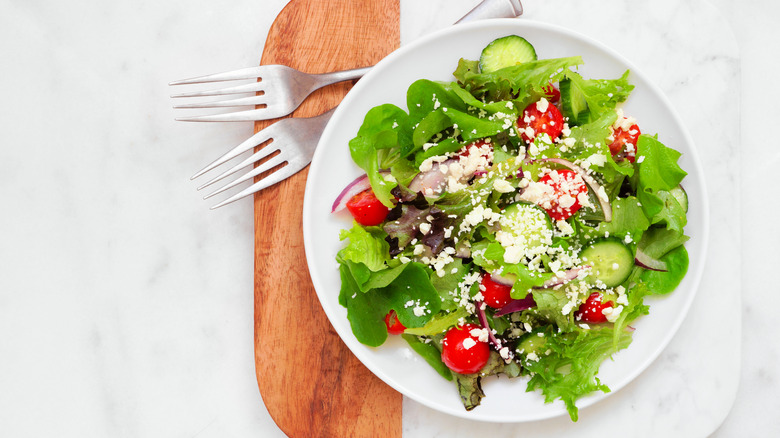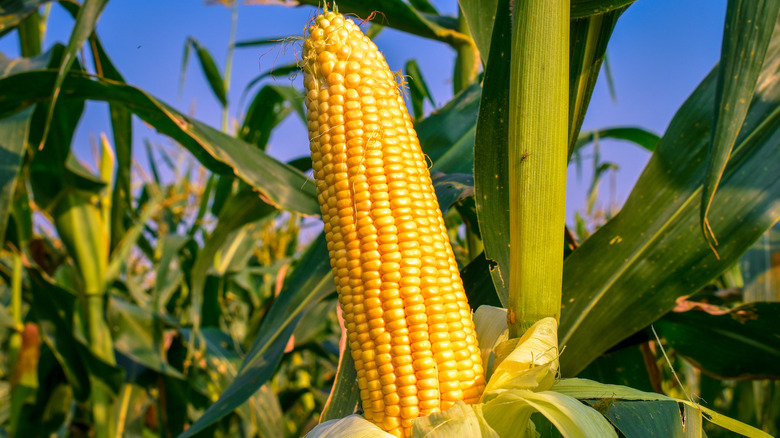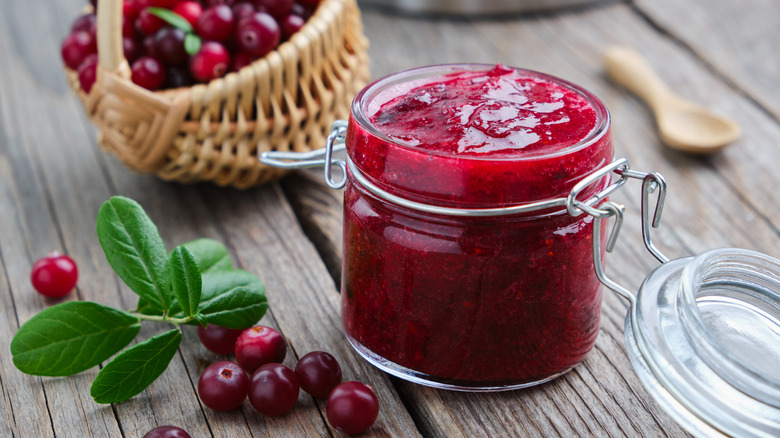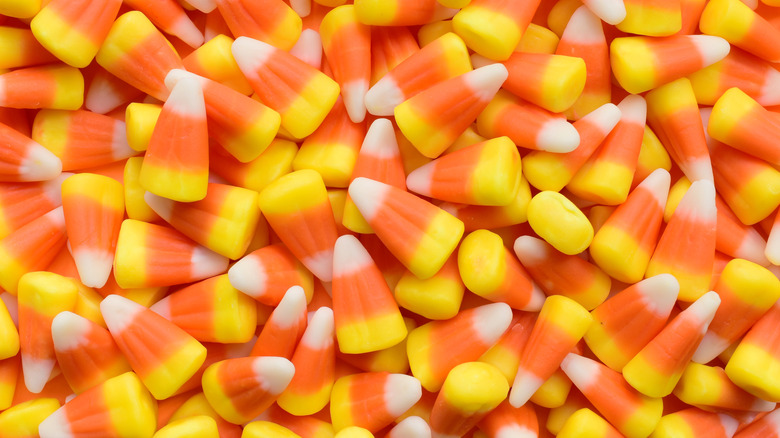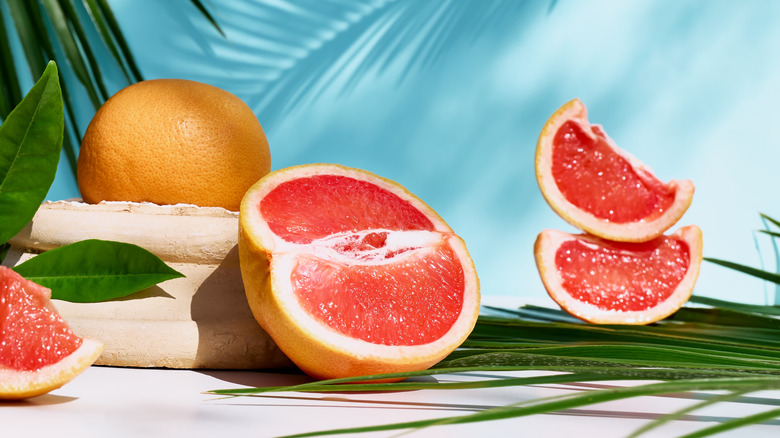Foods That Have More Carbs Than You Realized
When it comes to losing weight, the spotlight has been firmly fixed on avoiding carbs for some time. With the boom of low-carb diets, like the keto diet, it feels as though everyone's keeping an eye on how many carbs they eat. It's important to remember, though, that eating carbs is not necessarily synonymous with eating unhealthily, although many people seem to think so. "I always find it interesting and funny when someone wants to cut out carbs but wants to eat healthfully," registered dietitian Lainey Younkin, owner of Lainey Younkin Nutrition in Boston, told Today's Dietitian. "I'm like, 'Do you know that fruits and vegetables are carbs?' When they think carbs, they're thinking about bread, pasta, and rice."
Do you know what other foods contain carbs? Although many experts do not recommend cutting out carbs altogether, you may want to try healthier carbs over refined carbs, or not eat quite so many. Let's take a look at some of the most subtle heavyhitters.
Adzuki beans have more carbs per cup than spaghetti
While beans aren't exactly known to be carb-free, the carbohydrates in different types of beans massively vary. In one cup of boiled adzuki beans, you're looking at a total of 57 grams of carbs, according to Calorie Friend, as well as a whopping 17 grams of protein. For a carb comparison, that's actually more than a cup of cooked spaghetti, which clocks in at just over 43 carbohydrates, according to Verywell Fit.
Despite these beans' high carb content, you'd be remiss to overlook them nutritionally. "This bean is a superstar," nutritionist Jenna Appel revealed to HuffPost. "It's got a lot of really amazing vitamins and minerals, and is really on point with its amount of micronutrients." These micronutrients, including folates and manganese, have a multitude of health benefits. Additionally, of the carbs present in adzuki beans, many of them come from soluble fiber, which can help to reduce LDL cholesterol levels (via Mayo Clinic).
Both dairy and non-dairy milks contain a fair amount of carbs
Milk, particularly the full-fat cow's kind, maybe isn't the first thing you think of when it comes to carbs. But it turns out, milk has a surprisingly high amount of carbohydrates. Regular cow's milk has around 12 grams of carbs per cup, according to Medical News Today. And the amounts are similar even if you're opting for 2%, 1%, or skim milk: in fact, 1% and skim milk contain slightly higher levels of carbs, at 13g per cup.
So, what about non-dairy milk alternatives like almond or oat milk? Unfortunately, on the carb front, they're not much better. With oat milk in particular, "it is definitely higher in carbs compared to cow's milk or other nut milks," said Vandana Sheth, a spokesperson for the Academy Of Nutrition and Dietetics, to Buzzfeed. A cup of Oatly's Original oat milk contains around 16 grams of carbs per cup, with 7 grams of sugar, while Blue Diamond's Original Almond Milk fares slightly better, with 8 grams of carbs per cup (via Today).
Cashew nuts aren't just high in fat
Wait a minute ... nuts are meant to be high in fat, right? They definitely are — but certain types of nuts may also sneak in some carbs. Such is the case with cashew nuts. And just an ounce of cashews will deliver almost 9 grams of carbs, says Verywell Fit. The majority of the carbs come from starch, complex carbohydrates which take longer for your body to break down, which means that they don't have as much of an effect on your blood sugar, according to the Cleveland Clinic.
However, if you're not needing to massively restrict your carbohydrate intake, the number of carbs in cashews could be a worthwhile payoff for their other health benefits. "Cashews are rich in copper, which plays a role in the immune system, brain development, and energy production, said registered dietitian Erin Palinski-Wade, author of 2 "Day Diabetes Diet," to The Healthy. "Cashews are also a good source of magnesium and manganese, which play a role in bone health."
Condiments like ketchup boast quite a few carbs
We generally don't think about the nutrition of our condiments as much as we maybe should. But add-ons to our meals, like ketchup, can have a subtle but very real effect on our diets. Ketchup, for example, is particularly high in carbs. "It's deceiving because [ketchup] has no fat, so people think they can enjoy freely," Monica Auslander, a registered dietitian and founder of Essence Nutrition, told The Healthy. "Unfortunately, we now know that sugar is far more insidious than fat."
The carb load in question is 4 grams per tablespoon, according to Carb Manager. And a typical serving is 2 tablespoons. This may not seem like a lot, but when you consider that it's basically pure sugar (and is, as Auslander revealed, roughly equivalent to eating a few packs of the sugar that you pour into your coffee), it looks a little less rosy. On top of that, how many of us really regulate our ketchup portioning, as opposed to just pouring it on top of our fries with liberal abandon? Next time you do, remember that it all adds up.
The sweetness in a mango comes at a cost
It's probably no surprise that super sweet, juicy mangoes have some carbs. But how many carbs they contain may just surprise you. If you're snacking on a whole mango, you could be looking at around 31 grams of carbs, according to Shape. For comparison's sake, that's almost equivalent to a full cup of cooked wild rice, or just under ⅔ cup of cooked white or brown rice, says Healthline.
The carbs in mangoes primarily come from sugar, but there are roughly 3 grams of fiber in each full mango as well. However, the other nutritional aspects of mangoes should make them a go-to choice over less healthy sources of sugary carbs, like candy. "Mangoes are loaded with antioxidants that protect your body against free radicals," Megan Byrd, registered dietitian and founder of The Oregon Dietitian, told Shape. Furthermore, Byrd explained that the high vitamin C content in mangoes can "aid in collagen formation for healthy hair, skin, and nails," as well as helping to support immune function and providing antioxidants.
Raisins are full of sugar
It's all too easy to throw back handfuls of raisins as a seemingly healthy snack alternative to chocolate or candy. However, as dried fruit, you're getting a lot of concentrated sugar in one bite. In fact, raisins deliver a pretty whopping 22 grams of carbohydrates per 1-ounce serving, 18.2 grams of sugar, as well as just over 1 gram of fiber according to Verywell Fit. Because of this, raisins have slowly but steadily gained a reputation as a no-go for carb-watchers, contributed to by their rather high place on the Glycemic Index (GI). This system helps determine how much of an impact a food will have on your blood sugar; foods with higher numbers cause a larger blood sugar spike (per Healthline).
A food's place on the GI, however, doesn't necessarily take their nutrition into account. "A soda has a Glycemic Index of 63, while raisins have a Glycemic Index of 64, however that does not mean raisins and soda have the same nutritional value," registered dietitian nutritionist Amanda Markie, an outpatient dietitian at UM Baltimore Washington Medical Center, told NBC News.
Whole-wheat tortillas aren't much lower in carbs compared to bread
The flatter sibling of bread, whole-wheat tortillas are generally considered to be a healthier option than their fluffy, loafy counterpart. That's not quite the case when it comes to carbs, though. A single 45-gram whole-wheat tortilla still contains 22 grams of carbs and 4 grams of fiber, according to Carb Manager. That's only slightly less than a 42-gram slice of whole wheat bread, which contains approximately 23.7 grams of carbs (per Carb Manager).
However, for those wrap lovers out there, there may be some hope on the horizon. Opting for a corn tortilla instead of a whole-wheat one can be an all-around healthier choice, says Healthline. Not only are they generally lower in carbs as well as fat and calories compared to white flour tortillas, but they're also usually smaller in diameter and weight, meaning that portion control is simpler. They're also a good source of fiber and magnesium. That said, whole-wheat tortillas will generally be better on the fiber front than white flour tortillas, with 1 white flour tortilla containing just 1 gram of fiber, according to Eat This Much.
Protein powder isn't just protein
Beloved by fitness fanatics worldwide, protein powder is an easy and efficient way to get a large amount of protein in one go. However, a lot of protein powders out there aren't just pure protein, which can lead to issues for those on certain diets. "Keto diet followers are often surprised to learn that many protein powders also contain carbohydrates," registered dietitian nutritionist Tammy Lakatos Shames told Women's Health.
Some protein powders can contain 3 to 4 carbs per scoop, possibly more depending on the flavorings added, says Healthline. This may not seem like a lot, but when you consider the fact that keto dieters try to consume no more than 50 grams of carbs a day to stay in ketosis, there's a slim margin for error.
That said, there are protein powders with fewer carbs. Vega Sport Premium Protein and Ketologie Collagen Keto Shake are just two brands that Women's Health suggests.
Chickpeas contain 40 grams of carbs per cup
The humble chickpea is a thing of beauty, and the foundation for hummus, which as far as we're concerned, is perfection. That creamy goodness comes with carbs, though. As a legume, chickpeas are surprisingly high in carbs; just 1 cup contains 40 grams of carbohydrates, according to Shape.
It's important to remember, though, that many of those carbs come from fiber, with approximately 13 grams per cup. This fiber can help with a range of bodily functions and disease prevention, including colorectal cancer. "When you eat chickpeas, the fiber passes through your digestive tract and is broken down by bacteria in your gut," registered dietitian Alyssa Northrop confirmed to Shape. In doing this, the production of a short-chain fatty acid called butyrate is initiated, which can help to prevent the multiplication of colon cancer cells, according to a review published in the Journal of Cancer. The fiber in chickpeas can also have positive benefits in lowering diabetes risk and in supporting heart health. Not bad for a simple garbanzo, right?
What about salad dressings?
When you're making a salad, the last thing you want is to negate all its nutritional goodness with a dressing. Of course, the flip side is that without dressing, a salad can be pretty boring. "I have some clients who say they'll only eat salad if they can use dressing. That can add a lot of calories, sodium, sugar, and saturated fat," registered dietitian Kathy McManus, director of the Department of Nutrition at Brigham and Women's Hospital, explained to Harvard Health.
Seems like a catch-22, right? Well, the good news is you can optimize your salad dressing choice. And you probably should, as certain salad dressings, particularly fat-free or low-fat kinds, can typically be higher in sugar to pack in the flavor, says Verywell Fit. In fact, just 2 tablespoons of Kraft Fat-Free French-Style dressing contains 9 carbs, according to Fat Secret.
To keep your salad healthy, opt for salad dressing with a heart-healthy oil like olive or canola oil (per Verywell Fit). And, ideally, avoid shop-bought and make your own, so you can keep an eye on its carb levels.
Corn contains a lot of carbs, but it has many nutritional benefits
Corn's fairly well-known as a vegetable that contains carbs — but what's surprising is actually how many carbohydrates are delivered in a serving. "Just like one slice of bread, half a cup of corn contains a similar amount of calories and carbohydrates," registered dietitian and spokesperson for the Academy of Nutrition & Dietetics Julie Stefanski told MindBodyGreen. That's nearly 15 grams of carbs per half-cup serving (via Fat Secret).
Corn, however, has plenty of other qualities that make it a great nutritional choice. The vegetable is rich in vitamins and minerals such as vitamin C, folate, thiamin, magnesium, and potassium, according to Healthline. It's also worth bearing in mind that much of corn's carb content is composed of fiber, pretty beneficially. "If we're looking at getting lots of good fiber in our diet, it's good that [corn] has a higher ratio of insoluble to soluble fiber because it feeds the good gut bacteria in our body," registered dietitian Jennifer McDaniel, a spokesperson for the Academy of Nutrition and Dietetics, explained to HuffPost.
The carbs in cranberry sauce is astonishingly high
If you're like us, it's hard to keep away from the cranberry sauce around the holidays. Be careful with your serving size, though. Despite it having a base of healthy cranberries, its sugar content can be massive. "Because cranberries are naturally tart, many packaged cranberry sauces and cranberry recipes are loaded with added sugar," Jenn LaVardera, registered dietitian and nutrition expert with produce company Naturipe Farms, confirmed to Popsugar. How much sugar? Well, a single cup of cranberry sauce can contain an astonishing 107.8 grams of carbs, 105 grams of which is pure sugar, says Eat This Much. We know, we know — we were surprised too.
Although cranberry sauce is generally the kind of thing you eat on a special occasion, there are still some things you can do to reduce the carb impact. "Your best bet is to prepare your own cranberry sauce using fresh or frozen cranberries and a touch of added sugar that will tame the cranberries' tartness but not overpower the natural flavor," said LaVardera.
Beware of candy billed as fat free
Okay, yes: Candy has carbs. Shocker. But we added fat-free candy to this list for a reason: to highlight exactly how much sugar is often present in these sweet treats, particularly when they're billed as low fat or "healthier" in some form or another. Candy corn, for example, "contains more than double the sugar of a Snickers or Reese's," said registered dietitian nutritionist Amy Gorin, the owner of Amy Gorin Nutrition in Jersey City, to Everyday Health. That's roughly 37 grams of carbs for just 21 pieces, says Eat This Much. This is despite containing 0 fat, of course.
If you're watching your carb intake, any off-the-shelf candy may be off-limits. However, options like dark chocolate bites, depending on the brand, can be lower in sugar and carbs. As always, check the label before you buy — and don't be fooled by "health halo" branding.
Grapefruit may be bitter, but it has a lot of sugar
There was a time when half a grapefruit for breakfast was considered the height of health. However, nutritionists have, for a long time now, been pretty skeptical. "The myth of grapefruit and weight loss has been around for years," Molly Kimball, New Orleans-based registered dietitian at Ochsner Fitness Center, told My Fitness Pal.
In fact, if you're looking to avoid carbs, they might be your diet's demise. A serving of grapefruit contains around 13 grams of carbs, with 8.5 grams of these from sugar, according to Verywell Fit. That may not sound like a huge amount, but more than you might expect from the bitter fruit. And beware of grapefruit juice, too. "You might as well be drinking sugary lemonade or sweet tea. When you're drinking this, know that you're not burning fat but helping your body store more fat with the excess sugar you're adding," Kimball explained. Grapefruit juice can contain 16.3 grams of sugar per 100 milliliters, according to Coach. If you're trying to keep your carbs down, it's better to eat it whole.


